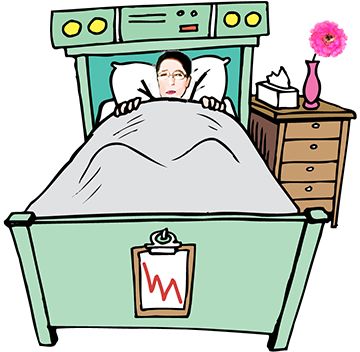Surviving the Emergency Room |
|
By the time my doctor sent me to the hospital emergency room (ER) for a chest x-ray and an evaluation, I had a persistent fever, a horrible cough, and was wheezing so badly it was audible without a stethoscope. This was after three days on a drug cocktail prescribed at an immediate care facility. The likelihood of being hospitalized was disconcerting, as we have all heard horror stories of people with Parkinson's (PWP) not getting their meds on time and the cascading medical problems this creates. Knowing my husband would not leave my side was key to keeping my anxiety in check. What I hadn't considered is how the electronic medical record (EMR), intended to reduce potentially fatal errors, is only as good as the people inputting and retrieving the information. Though I told the person updating my EMR about having Parkinson's, the next person who called up my digital chart asked how long I had had Alzheimer's, a ridiculous question for someone plagued by memory issues. "Is that what my chart says?" I demanded angrily. "I have Parkinson's, not Alzheimer's." My husband vouched for me. My chest x-ray confirmed I had pneumonia, but my room was still not ready. I begged to go home with oral antibiotics, but the nurse threatened that if I did, I'd be returning by ambulance the next day. I was beginning to believe that staying overnight would kill me sooner. They wanted to start me on IV antibiotics in the ER, assuring me that they would not interfere with my MS medicines. This was about the time I lost it. "I don't know where this misinformation is coming from, but I do not have MS," I told everyone within earshot. "No one comes near me with an IV until I reach my neurologist and she approves the medicine you plan to give me." Admittedly this plan was totally unorthodox, but it worked. Six hours elapsed from when I entered the ER to when I got up to my room at 10 p.m. I had not eaten since lunch and no one offered me so much as crackers. |
Fortunately, I had brought my meds with me and kept to my normal dosing schedule without anyone noticing. That would be a battle for another day. (to be continued) Anyone can find themselves in this situation. Here are some starting points to ensure that you get the proper medical treatment:
|
email us directly at: Sheryl@pdplan4life.com (c) 2015 PDPlan LLC All Rights Reserved Without express written consent, this material may only be used for your own personal and noncommercial uses which do not harm the reputation of PDPlan LLC, provided that you do not remove any copyright. To request permission to reproduce, please contact PDPlan LLC at Sheryl@pdplan4life.com |
 |
 |



